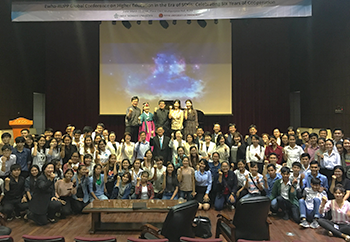
For the past six years, Ewha has been involved in the Official Development Assistance (ODA) project to help Cambodia’s education system. The project started in 2012 and came to an end early this year in May, sponsored by the Ministry of Education (MOE) and the National Research Foundation of Korea.
In 2012, Ewha professors partnered with the Royal University of Phnom Penh (RUPP), the country’s oldest and largest university. The ODA project was named “Cambodia’s Capacity Enhancement for Sustainable Development.” Ewha was one of the two selected universities to participate in the ODA project by MOE.
“Luckily at the time, Graduate School of International Studies (GSIS) and Department of Social Welfare had ongoing research projects on aiding developing countries,” said Professor Kim Eun-mi, who led the project. “Also, the Department of Global Korean Studies was planning to visit other countries to share its curriculum. The project was a great chance for us to take action on our research plans.”
A total of four departments from Ewha participated in the ODA project including the Department of International Studies (DIS), Department of Global Korean Studies, Department of Social Welfare, and Department of Environmental Science and Engineering.
Alongside Professor Kim, the dean of GSIS, the following professors participated: Professor Cho Sang-mi and Kim Mee-hae from the Department of Social Welfare, Oh Jin-hwan from the Department of International Studies, Park Sun-hee and Lee Hai-young from the Department of Global Korean Studies, and Choi Yong-sang from the Department of Environmental Science and Engineering.
According to Professor Kim Eun-mi, through the project, the team aimed to share curricula in the four departments and re-educate the local professors to adopt the Ewha model to the school. With the support of Ewha professors, RUPP hosted their first international conference at the school.
Furthermore, Ewha participated in creating the Cambodia Development Institute (CDI), the country’s first research facility. This establishment built a basic database for various statistics of Cambodia and Asian countries. CDI even hosted special lectures, seminars, and conferences including Model UN and Ewha-RUPP Global Conferences.
Professor Oh Jin-hwan from DIS helped create CDI to help the country to examine its economic status with its own research foundation.
“We focused on ‘ownership,’ which is one of the top five principles for Smart Aid by OECD, when establishing CDI,” Professor Oh said. “With a team of professors from our department, we planned a variety of research activities to share the development experiences of Asian countries with Cambodia. The project may have ended, but we still share this research with students through online lectures. Also, the management committee is actively updating the website with the project’s achievements.”
The Department of Environmental Science and Engineering, Ewha gifted RUPP by constructing Cambodia’s first air pollution monitoring hub. The project aimed to help RUPP manage Cambodia’s serious air pollution problem.
“We started the project without a fixed plan,” Professor Choi Yong-sang said. “Our aim was to provide what was most demanded by the school, which was an air pollution monitoring device. Therefore, we set two devices for them – one in RUPP and the other near the King’s palace.”
Professor Choi’s team also created an app called “Rainbridgeo,” which tracks and alerts citizens of natural disasters. This was the College of Engineering’s first establishment. The team realized there was no communication with citizens regarding weather issues.
“There were so many tragic accidents that could have been avoided, like people getting hit by hail and dying,” Professor Choi added. “We wanted to create a network between NGOs, the government and citizens to deal with the unexpected disasters, which is why we made the app.”
The Department of Global Korean Studies also actively contributed to the project by helping to build the curriculum of RUPP’s Department of Korean. The school saw a noticeable increase of 321 percent in the enrollment rate, according to Professor Kim.
The project came to an end with outstanding outcomes including better employment rate and enrollment rate. The participating professors also published a book reflecting the six-year journey in Cambodia.
“Currently, we’re looking into supporting young girls’ health and education in developing countries,” Professor Kim concluded. “I hope to carry on more projects like this for people in developing countries including North Korea.”

